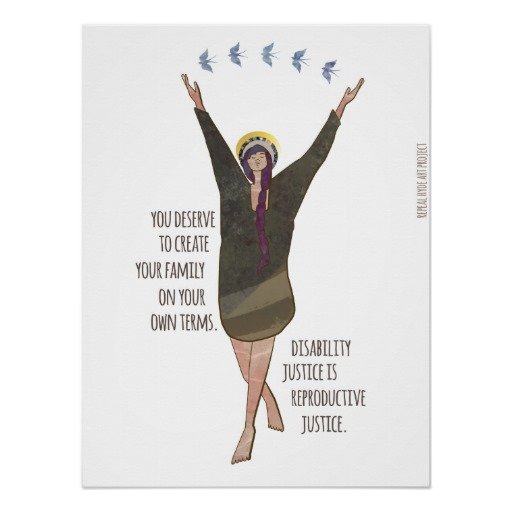How Bans Affect Patients with Disabilities
 This week marks the 40th anniversary of the Hyde Amendment, which bars Medicaid recipients from using their benefits to pay for abortion care in many states. Our volunteers are sharing the stories of why our work is vital in the face of these restrictions. Today, case manager Meredith N. talks about how laws restricting abortion access disproportionately affect people with disabilities.It’s that time of year where we wish the Hyde Amendment a happy unbirthday and continue to fight the good fight to end the ban(s) on abortion coverage. However, it is discouraging to see so many reproductive justice activists neglect to mention that people with disabilities are disproportionately impacted by the Hyde Amendment as well. The reality is that people with disabilities are more likely to be poor as well as rely on state insurance programs such as Medicaid and Medicare to meet our health care needs. I currently live in Maryland which both expanded Medicaid and is one of the 15 states where Medicaid covers abortion care. Unfortunately, the lack of transparency surrounding how to access this benefit means that few are aware it does not apply to the Aged, Blind or Disabled Medicaid that SSI beneficiaries receive (perhaps because there is the false assumption we do not need it). In turn, repealing Hyde is a disability justice issue as well. At the same time, a world without Hyde means little as long as our society continues to look upon disabled sexuality with fear and disgust. A world with reproductive justice would affirm the diversity of body/minds in the world by recognizing that we, too, deserve full spectrum reproductive health care.As a result, I DCAF because disabled people need abortion access, too. Neglecting to consider this hurts multiply marginalized disabled people the most. I DCAF because the seemingly insurmountable financial barriers to an abortion are compounded when you are turned away from clinics because you are considered a high risk patient, your accessibility needs cannot be met, or you must go without lifesaving medication in order to come up with gas money. I DCAF because too many people with disabilities remain isolated by an ableist world and I want to be a lifeline whom anyone facing an unplanned pregnancy can call when they have no one else to turn to. I DCAF because everyone deserves access to safe, accessible abortion care regardless of how much cash they have, regardless of whether or not society believes they “should be” having sex or not, regardless of whether or not they are “productive” enough, and whether or not their necessary accommodations are “reasonable” enough.Nonetheless, abortion funds and other reproductive justice groups shouldn’t wait until Hyde is repealed to commit to this anti-ableism work! As someone who has funded abortions both locally and nationally, it is all too apparent that abortion funds are working with many disabled callers — regardless of whether or not these callers identify as such — but are poorly equipped to recognize our needs, much less accommodate them. I encourage you to consider how you can better incorporate dis/ability into your intersectional frameworks: whether that’s eliminating ableist language such as “crazy” or “lame” from your fund’s vocabulary or taking more extensive steps of disability solidarity.by volunteer Meredith N.
This week marks the 40th anniversary of the Hyde Amendment, which bars Medicaid recipients from using their benefits to pay for abortion care in many states. Our volunteers are sharing the stories of why our work is vital in the face of these restrictions. Today, case manager Meredith N. talks about how laws restricting abortion access disproportionately affect people with disabilities.It’s that time of year where we wish the Hyde Amendment a happy unbirthday and continue to fight the good fight to end the ban(s) on abortion coverage. However, it is discouraging to see so many reproductive justice activists neglect to mention that people with disabilities are disproportionately impacted by the Hyde Amendment as well. The reality is that people with disabilities are more likely to be poor as well as rely on state insurance programs such as Medicaid and Medicare to meet our health care needs. I currently live in Maryland which both expanded Medicaid and is one of the 15 states where Medicaid covers abortion care. Unfortunately, the lack of transparency surrounding how to access this benefit means that few are aware it does not apply to the Aged, Blind or Disabled Medicaid that SSI beneficiaries receive (perhaps because there is the false assumption we do not need it). In turn, repealing Hyde is a disability justice issue as well. At the same time, a world without Hyde means little as long as our society continues to look upon disabled sexuality with fear and disgust. A world with reproductive justice would affirm the diversity of body/minds in the world by recognizing that we, too, deserve full spectrum reproductive health care.As a result, I DCAF because disabled people need abortion access, too. Neglecting to consider this hurts multiply marginalized disabled people the most. I DCAF because the seemingly insurmountable financial barriers to an abortion are compounded when you are turned away from clinics because you are considered a high risk patient, your accessibility needs cannot be met, or you must go without lifesaving medication in order to come up with gas money. I DCAF because too many people with disabilities remain isolated by an ableist world and I want to be a lifeline whom anyone facing an unplanned pregnancy can call when they have no one else to turn to. I DCAF because everyone deserves access to safe, accessible abortion care regardless of how much cash they have, regardless of whether or not society believes they “should be” having sex or not, regardless of whether or not they are “productive” enough, and whether or not their necessary accommodations are “reasonable” enough.Nonetheless, abortion funds and other reproductive justice groups shouldn’t wait until Hyde is repealed to commit to this anti-ableism work! As someone who has funded abortions both locally and nationally, it is all too apparent that abortion funds are working with many disabled callers — regardless of whether or not these callers identify as such — but are poorly equipped to recognize our needs, much less accommodate them. I encourage you to consider how you can better incorporate dis/ability into your intersectional frameworks: whether that’s eliminating ableist language such as “crazy” or “lame” from your fund’s vocabulary or taking more extensive steps of disability solidarity.by volunteer Meredith N.
